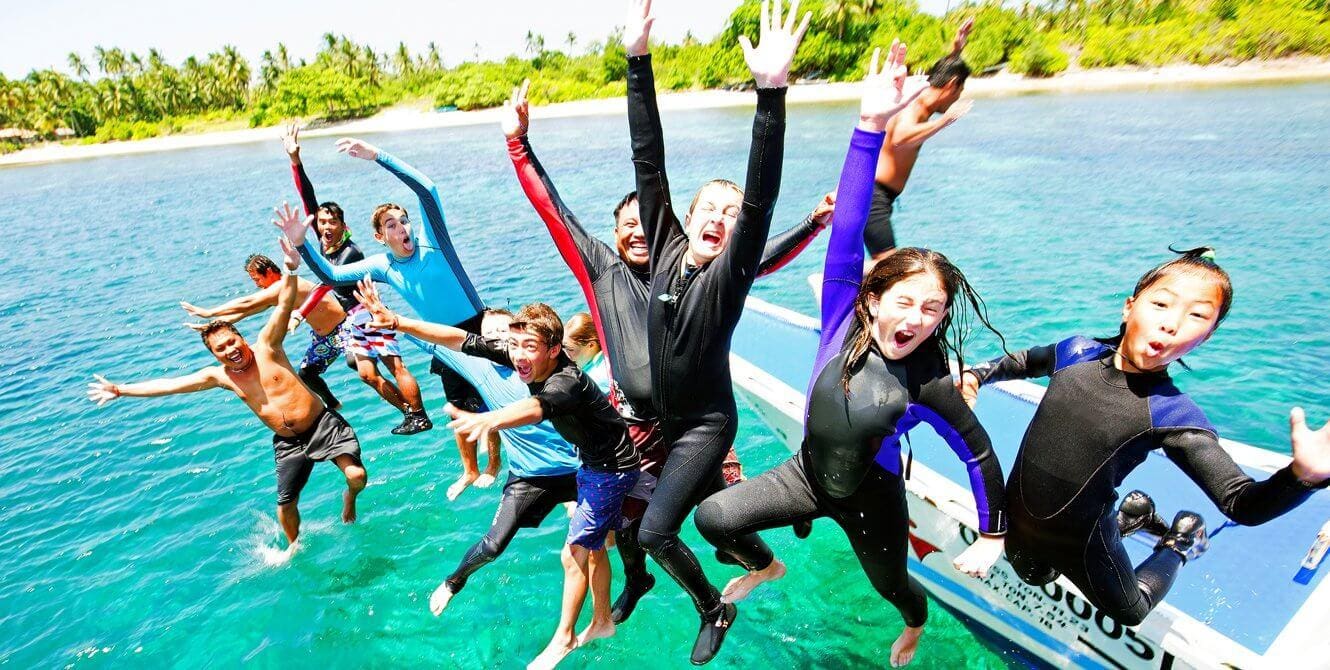Margo’s Top 10 points when teaching to or diving with Kids
Top 10 tips, when teaching kids to dive
Diving tips by Margo Peyton, founder of Kids Sea Camp
- Kids have very short attention spans. They learn better visually and by doing things repetitively.
- Gauges and depth. Once most kids are certified, its all about skill to them. The deeper the cooler. They are constantly talking about depth. So I turn this around and try to make it all about good air consumption and buoyancy. First of all when diving with kids, for trainers or parents, I never ask a child under water what is the amount of air left in their tank by showing me an OK sign or showing me fingers. I take the guage in my hand and I look at it as well as Maximum depth. Kids don’t want to be the first to run out of air and they don’t want to end their dive. diving with kids, you have to take the normal time frame in which you would turn around to your divers and both check on them and ask them how much air they have and times it times 3 on a 45 minute dive, I turn around every 3 min to loom at my kids and give them all an ok sighn as well as every 5 min check guages. You may thing that is ultra-conservative, but from someone who has been diving with kids for 15 years, many can go through air twice as fast as adults. They are excited, and nervous.
- Give very detailed briefings, and also make sure when your diving with kids, that you ask them when the last time they dove was, also ask how they are feeling. Notice a cough or a runny nose. Parents more than likely filled out the forms and may not even have asked how their child feels. . They may be nervous or stressed because they don’t know anyone. During your briefing tell them a funny dive story from when you started diving, put them all at ease. Go over how to inflate and deflate the BC and signals. Even thought kids are certified, they are afraid to openly ask questions or state they don’t know something. They don’t want you to think they are dum or new etc. So they don’t ask. make this your job. Remind them how to set up gear and then watch them. Remind them of how to be a good buddy, stay close to their buddy. Kids Get Side tracked all the time. If you have ever sat in the passenger seat of a new teen driver, than you know how many times they have taken their eyes off the road. Underwater is 10 times worse. They see cool fish and tons of colors etc the forget to look for their team, their buddy, and their gauges.
- Take the fear out of them. Tell kids how much fun it is to dive, tell them all the things they can see and do. Psych them up about good buoyance and show them some cool ways to be neutral. It really helps to make things fun and interesting.
Kids are not adults, they don’t learn like adults, they don’t want to read books and study, they want you to tell them, they want you to show them. Slow every thing you do down. Ask questions to everyone randomly when you just finish teaching something. This is a fantastic thing to do. - Excuses. If a child is telling you their tummy hurt and they cant dive, or their ear hurts and then need to go up. This may be the case, but watch that it is not repetitive and constant. Trust kids are very quick learners and they know that if they tell you their ear hurts or they are stuffed up or they have a tummy ache, that you will not make them dive. No discussion, no argument etc. This could also be a sign that the child is just feeling insecure and scared and or not as good as the other kids. If it happens once, conform, give the child a break, and then make sure to mention it to his or her mom that same day. If the parent things its strange and does not think there is anything wrong with the child, it just might be fear. I will work one on one with a child, talk to then to find out what the block is, mom and dad can help in this area too. Find out what the problem is. 50% of the time, it can be overcome, its one skill like mask removal that has them stressed etc. Sometimes, they are just not ready, not liking this and a parent is pushing and they don’t want to disappoint their family. Make what ever it is ok, address it and do your best to find out what its about. Assure parents, they don’t want to push a child, because if they have a bad experience it may end up in them not wanting to dive. Kids have all the time in the world and can take their time.
- Gear: This is very important. Gear really needs to be perfectly fitted. Take the time to make sure fins fit and are not causing blisters, masks don’t leak and the BC is not chaffing a childs arms. These things can go un noticed and often do, until 3 days later when the child can’t go on because their is a sore. Fins can last a year or two if they get the adjustable kind. A mask too. Soft silicone is much better for little faces. A wet suit and a minimum of a rash guard are a must, Kids get cold. A parent would not send their child out in to the snow with out a coat. Again emphasize the importance of gear. And if your using rental gear, make sure the dive shop has the xxs and xs that many kids need. don’t just settle with a size too big. This causes much more stress on a child than an adult and can ruin the entire experience, therefore losing a future diver.
- Tanks; this too is very important. I hate seeing a 10 and 11 year old and even some small 12 year olds with an 80 or 72 on their back that they can barely lift. Don’t make a kid walk with a heavy tank on his or her back, carry size 50 or 63’s for kids.
- Be conservative with ratios. If you can take the number of kids your going diving with from one end of a mall to the other and not lose one, then your good. Diving with kids is like diving in a bate ball, if you have not done that, try it.
Keep kids close together and in buddy teams of 2 not 3 and not 4, always 2. A child can only focus on one thing at a time, so that is one buddy to keep tract of. I can tell you a million things that go wrong when you don’t use buddy Teams and when you use more than 2. - If I had a dime for every time an instructor said to me, ” Im not a baby sitter, they are certified divers,” I would be rich. You are a baby sitter, a parent, a dive buddy, an instructor and a pro! You are everything and anything when your underwater with a child.
You are aware, patient and on guard, you are fun you are safe and you assume nothing. If you need to hold a hand you hold a hand, if you need to go up early you go up early. You check air, you check guages, and you always follow up a question with confirming the answer visually. I have seen kids, with computers and they have no idea how to use them, or what the numbers flashing all mean etc. They just jump in the water and follow you and wait for you to tell them when to come up and go down. Confirm that they know how to read their gauges or computer, again check their air, check their gear and check their eyes and see if they are doing ok. - After the dive: What did you see? How was your dive? were you cold? How did your weight feel? We can take some off, add one on etc. compliment what was great and tell them a tip or two on what they can do to improve. Log the dives with them. They will not do this when they get home. It will be lost forever if you don’t do dive logs on the same day with them. Tell them how important logging their dives are and why its important. Tell them how many logged dives you have.
Most important! They watch you and you are their ambassador to the sea, you will determing in most cases whether a child becomes a diver or continues to dive. You are just like one of the teachers you had in High school that molded and shaped your life.
Im sure you have a teacher you can easily think of that you loved that inspired you and maybe one that did not and may have been the cause of why you did not like math or history etc. Be that teacher that inspired and caused a child to succeed. Be that teacher that guide that will never be forgotten. You effect every child and you effect the future of diving. The kids you turn out today are the divers of tomorrow, so if you can make a better diver, safer diver then do. - One last thing. When teaching kids, you have to be firm, but let them know you care, let them know they matter. Share your stories, your firsts and let them know with diving you get better with time and practice. Its important to let them know we all did not start out as good as you are today. Lots of high fives! Don’t rush them, let them go at their own pace, and if one child is slowing down the class, because he or she needs a bit more time, just tell mom or dad they will need some private instruction.
Keep in touch, give them places to go dive, give them information on another course and reminders, when they turn 12, they can now do advance, or when they are 15, they can now do deep etc. Stay in touch. 803-419-2556
Margo Peyton, PADI Instructor

